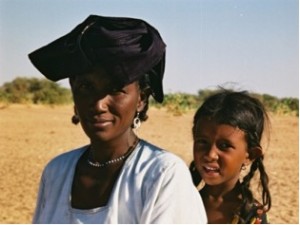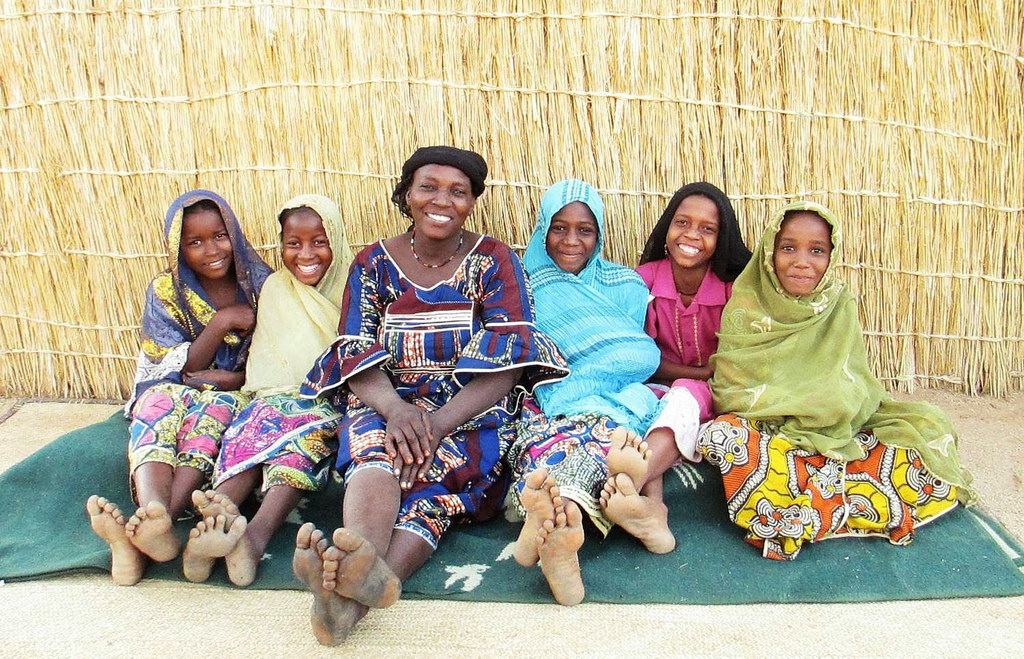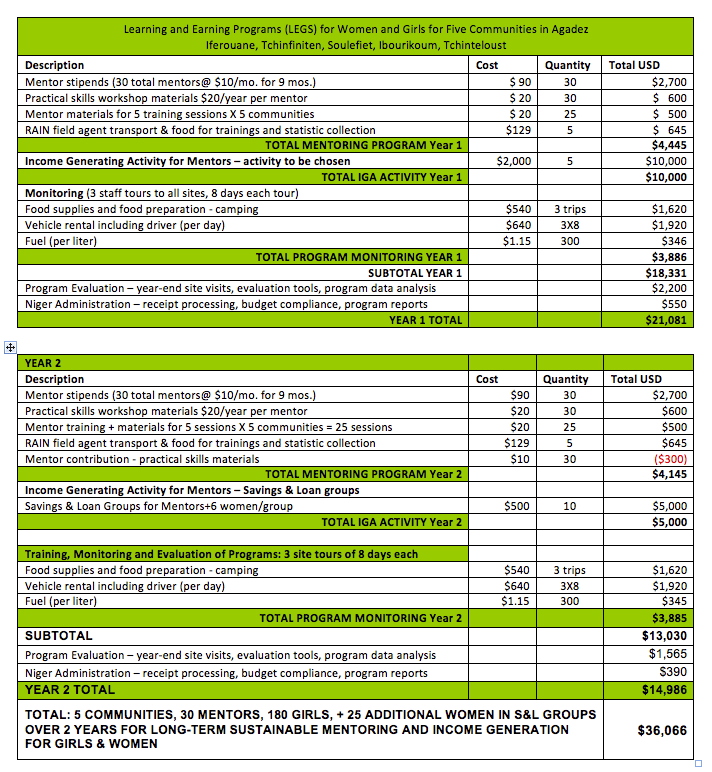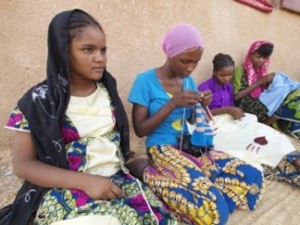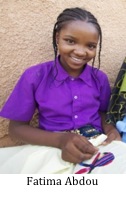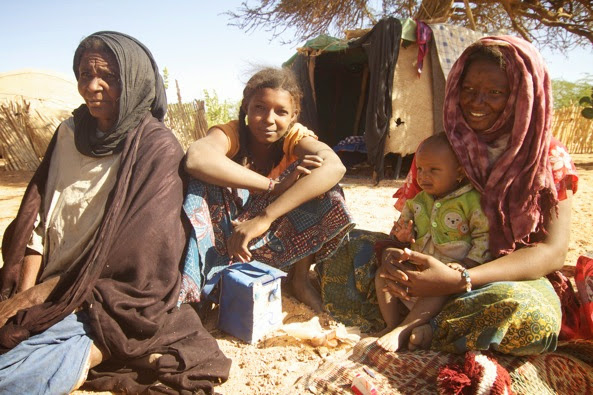
Mission
The mission of RAIN for the Sahara and the Sahel is to forge partnerships with underserved rural and nomadic desert communities of West Africa to realize their ambitions for education and enduring livelihoods.
Our featured program for July introduces an overlooked nomadic people desperately trying to eke out a living in a changing environment with a fickle climate in a harsh, remote part of the world where most NGOs don’t go. It also features a small NGO with a determined founder who on a visit saw the plight and pluck of the nomadic people and, when she learned there was no government or NGO to help them educate their children, founded RAIN. In the 13 years since founding RAIN, Bess Palmisciano and her small team have managed to help this population find clean water, create gardens, grow crops, raise herds and improve their schools. Through a mentoring program that helps the women, school girls, and school, RAIN brings added hope for the future of their people. (The name, RAIN, is not an acronym, but a metaphor.)
Dining for Women will help expand RAIN’s Learning and Earning Programs (LEGS) that empower nomadic women to improve their own economic status and create educational opportunities for the girls in their community. RAIN offers education, income generating activities, mentoring, and economic development training to support a vulnerable nomadic community in this poor and remote rural area of Niger.
DFW’s two-year grant of $36,066 will pay for mentoring programs for five communities (stipends, transport, food, workshop materials), income generating activity for mentors, Savings and Loan group training, and monitoring/evaluation of programs (food, vehicle rentals).
Life Challenges of the Women Served
Nomadic and rural people living in extreme poverty in the north of Niger make up RAIN’s partner communities. The Wodaabe (“woda abee”) and Tuareg (“twar eg”) are among the last nomads on earth. Though centuries-old traditions are still strong, the traditional ways of life are greatly at risk for nomadic people. Agricultural knowledge is traditionally not part of nomadic culture. Food insecurity looms large, and they are dependent on livestock for food and income.
During drought periods over the past two decades, nomadic and rural people in the region lost much of their livestock. Unable to sell their herds for a decent price, since animal grain feed has become too expensive, many have been forced to give up their traditional herding way of life and move to the towns in order to find work. Frequently women are left behind for months or years while men go off to find work in neighboring countries.
Women in Niger do not fare well. Their opportunities for self-improvement and autonomy are few. They earn less than men, and only a third of the literate people in Niger are women. Maternal mortality rates are high and many women lack knowledge about or have access to healthcare. The average girl in Niger drops out of school after only three years. (Twice as many boys finish primary school.) Each additional year of school that a girl receives results in her having fewer children over her lifetime – enabling her to lead a healthier, more productive life.
Nomadic women and girls face multiple obstacles to education and livelihoods. More than a third of women in Niger are married die during childbirth.
The Project
The key to the success of the programs is teaching uneducated women to serve as mentors to girls currently in school, teaching them how to help themselves in business, and providing them with self-help tools to succeed. All successful programs in the Sahel center on education, which is the common ground that brings the Tuareg and Wodaabe people together.
The objectives of the programs are to:
- Help local women appreciate the advantages of education, later marriage, smaller families, hygiene and gender roles so they may effectively mentor and advocate for at-risk girls.
- Offer traditional skills classes for girls to offer the students possible future incomes and enhance the attraction of school for parents.
- Increase school attendance by girls each year.
- Have mentors develop Savings and Loan groups and an income generating activity of each group’s choice, such as goat herding, to improve livelihoods, support the mentoring program and support local schools.
Work with school girls gives the mentors a school experience they never had, and it allows them to teach the girls life skills as well as encourage them to stay in school and succeed. Mentors learn about health, hygiene and social issues that they share with both the girls they mentor and with the community. For their time spent traveling to the schools and mentoring, they earn a small stipend to cover their expenses, but they are also trained in an income generating activity of their own choosing, often herding, as part of a savings and loan self-help group. The group will be central to their business enterprise. Members learn the basics of loans and participation in a savings group. The group chooses one income generating activity that all will participate in, learns the business as a group, and learns to support each other. In return, the group agrees to give 50 percent of its annual profit to the school. The result may be hiring a new teacher, buying books, providing school uniforms, or financing other items that would improve conditions in the school.
Through the mentors, girls learn practical skills such as traditional cooking and crafts that, for many, will become an income source. The girls have the support and wisdom of their mentors to keep them strong, and they gain knowledge and confidence as they continue in school.
The mentors gain knowledge and confidence and learn from their students. They have influence in their community, and they earn money that they invest in the food security of their families.
At the start of the program, 30 women will be chosen to be trained as mentors based on their expressed interest, interviews, and recommendations from school directors. Each mentor is assigned to support six girls, chosen based upon family income level and circumstances as well the issues the girls face in succeeding in school, as identified by school personnel and the children. An additional 25 women will be selected to join the mentors in the Savings and Loan groups and income generating enterprises. So each of the five communities will have six mentors guiding six girls each, and an Income-Generating/S&L group comprised of six mentors and five additional women.
Questions for Discussion
- How does a program that helps adult women to earn a better living help the girls they mentor, the school, and the community as a whole?
- What are the benefits of the program requirement that mentors give 50 percent of their profits back to the schools?
- How is the program set up to become self-sustaining?
- We have seen many other programs with strong, determined, charismatic leaders. Could RAIN exist without Bess Palmisciano?
How the Grant Will be Used
DFW’s grant of $36,066 over two years will directly impact 235 women and girls and indirectly impact 1,490 students and families whose women and girls are involved in the program. The cost, per direct beneficiary, is $153.47 for two years of mentoring, enterprise development and establishment of savings and loan groups. The budget for each year is broken into four sections: Mentoring Program, Income Generating Activity (IGA), Monitoring, and Evaluation.
Why We Love This Project/Organization
RAIN works with a unique nomadic community in one of the poorest countries in the world. New and innovative methods such as loans, gardening training, animal husbandry, and artisan support are utilized to empower the women/girls of this community.
We love RAIN’s mission for communities to create their own solutions by galvanizing participants – effecting positive change at a cultural level within the framework of custom and tradition – that ensures the program’s durability after the initial period. Centuries-old norms that are prohibitive to a girl’s access to learning or a woman’s ability to be independent can give way to progress when parents become excited and proud of their daughter’s achievements, or a woman brings home a sum of money previously not thought possible.
Evidence of Success RAIN’s first mentoring group, formed in 2005, became independent in two years and is still active. Over the last eight years the mentoring program has enjoyed proven success. Girls in the program return to school each year in numbers 20 percent greater than students who do not have mentors. RAIN has expanded the program to fifteen schools across the Agadez and Tillberi regions of Niger. Now, 106 mentors and 405 girls are succeeding together.
In all, over 500 girls have benefited from the mentoring program. The information and support provided to girls and the awareness-raising campaigns in the community have a durable lifespan and network of beneficiaries. School attendance increases; mentors report that they are now viewed as “wise women”; girls pass the craft skills their mentors taught them along to their mothers, who go on to earn. Partner communities have demonstrated a significant shift in appreciating the value of education for girls and the economic possibilities for women.
Voices of the Girls
“I’d like to become a doctor to treat the sick and chase some of the horrible illnesses from my village.”
— 16-year-old Fatima Abdou, Agadez Learning Center
“As a RAIN artisan cooperative member, I’ve been learning new designs of items I already know, as well as how to make other items for the first time. It is thanks to this work that I’m able to regularly support my family’s needs. I’m gaining experience and earning a living doing what I love to do.”
— Halima Atchani
“Since RAIN introduced a mentoring program in 2009, our enrollment has increased from 65 to 233 students. I see the value of mentoring every day. The children come to school daily. We continue to see big changes – we now have 3 girls, the first ever from our school, who have gone on to middle school.”
— Issafou Amadou, Director Mari Primary School
“With this [S&L] activity, I acquired a knitting machine with a value of $160, from which I will continue to profit.”
— Fourera Alassane, RAIN mentor
About the Organization In 2000, founder Bess Palmisciano talked with desert nomadic parents she met while touring northern Niger with friends. Bess observed the severe countryside, the obvious poverty of its inhabitants and wondered how they lived. She visited a state-run boarding school for nomadic children and saw that there was no kitchen, no food, and no beds. Bess searched for NGO’s that might help the people she’d met achieve the access to education they sought for their children. Failing to find interest, she founded RAIN in December 2001.
RAIN initiated school market gardens that keep nomadic children nourished and in school as well as the first drip irrigated agriculture in northern Niger. In 2004, RAIN was selected as one of 42 implementing partners in 13 African countries for the USAID Ambassadors’ Girls’ Scholarship Program, which would evolve into the current mentoring program. RAIN initiated the first school-supporting enterprise program with artisans of Gougaram in 2006, and in 2011 the first girls under the mentoring programs graduated primary school. The first Savings and Loan group and women’s community cooperative garden were initiated in 2012, and in 2013 RAIN opened the doors of the Agadez Learning Center and dormitory, where nomadic students are finding the opportunity and support to attend secondary school.
Now in its 13th year, RAIN has grown a great deal. Thousands of parents volunteer in RAIN programs – digging gardens, leading committees, forming enterprises to support schools, and empowering themselves with literacy. More children are attending and succeeding in school, mentors provide guidance and practical skills to round out children’s education and school market gardens provide food to the children and greater food security for all. RAIN’s grassroots, integrated approach has fostered trust and galvanized community involvement across the Sahel and Sahara.
Where They Work
Niger is a desert country about the size of France, with no access to the sea. Most of the country outside of the capital has no paved roads, electricity, or infrastructure. The official language is French, but there are about 20 indigenous languages. The 2012 United Nations Development Programme Index ranked Niger as one of the poorest countries in the world. The average person in Niger is less educated, lives a shorter life, is less likely to be literate or enrolled in school and has less income than the average person in any other country on earth. While statistics for Niger are achingly low, they are even worse for the nomadic and rural peoples who comprise 85 percent of the total population. For example, both adult literacy rates and school enrollment rates among nomadic families is estimated to be only 10-15 percent.
Traditionally herders and caravaners, nomadic people in these regions are in trouble. They find themselves increasingly marginalized and with less and less room to live their lives as they have for centuries. Men must often leave their families – relocating to neighboring countries to find work – weakening the fabric of their traditions and ability to survive. Increasing drought brings more frequent food shortages and uncertainty. Schools lay abandoned, and nomadic children must work to help their families survive.
Source Materials
Documentation and images provided by RAIN for the Sahel and the Sahara to Dining for Women.
Video: From a Deep Well, Part 1 http://rain4sahara.org/gallery/videos/deep-well-part-1 and Part 2 http://rain4sahara.org/gallery/videos/deep-well-part-2

